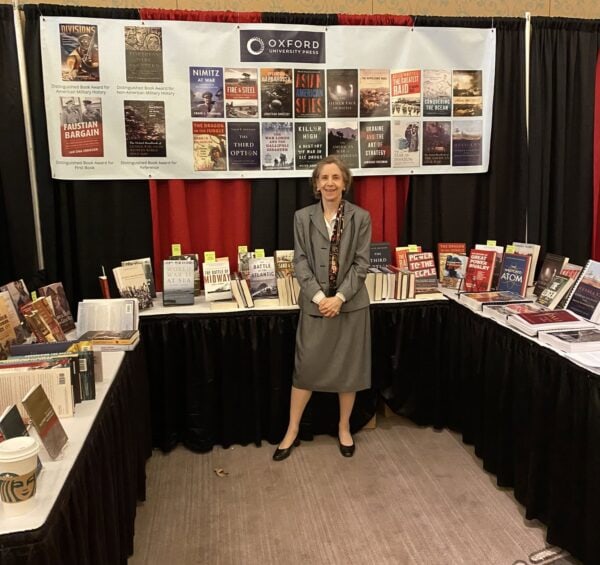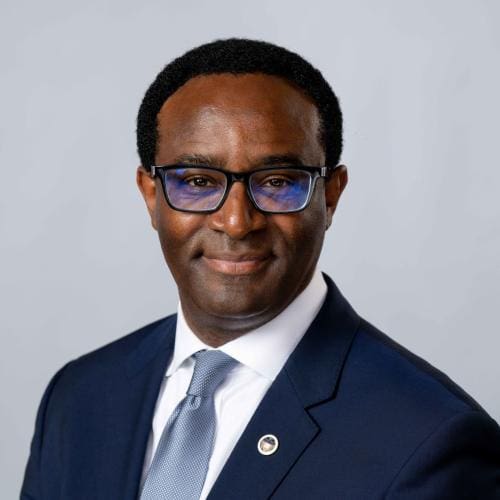Continuing my conversations with AHA members, I was delighted to speak with Nancy Toff for my latest interview. For 33 years, she has been a visionary force of Oxford University Press’s Academic Division as vice president and executive editor, acquiring and editing all varieties of history books ranging from monographs to reference and trade books. Toff is responsible for several book series, including the Very Short Introductions (on all subjects), Oxford History Handbooks, the New Oxford World History, the Oxford Oral History Series, and the Oxford Series on History and Archives. She was previously editorial director of young adult reference and trade reference at Oxford, and before that, she was vice president and editor in chief at Chelsea House Publishers. She has also worked at Grove Dictionaries of Music, Time-Life Books, and Silver Burdett Press.
Our conversation encompassed her celebrated career, technology’s impacts on our discipline, and what she believes the future of history will look like as a result.
What inspired you to take this particular career path?
I think they call publishing the accidental profession, and that is certainly true for me. I wrote my undergraduate thesis at Harvard University on the history of the flute; it was a little longer than it was supposed to be, but they told me to keep writing. Then I got it done, and they said I should publish it as a book.
I needed to get back to DC because the collection that I worked on was in the Library of Congress, and by pure luck, Time-Life Books was moving there right at the right time. I got a job there as a researcher, a fantastic job in every way. I was trained in how to do everything. I wrote two books while I was there, and I traveled all over the country to do research. I went to all kinds of wonderful archives in small towns that I probably will never get to visit again.
When I returned to New York, I began working for the Grove Dictionary of Music, and one thing just led to another, which led me to Oxford. You know you’ve died and gone to heaven when you come to Oxford and set up a department. When that department was shut down by our friends in the UK, I moved to the academic trade department and brought some of my projects with me while developing many others.
I’ve had the best of many worlds, but did I plan it that way? No, of course not.

Nancy Toff representing Oxford University Press at the 2022 Society for Military History conference.
What have been the most interesting moments of your career?
I don’t know if they’re interesting moments, but maybe fabulous would be better. One was a dinner with John Hope Franklin and his co-author Loren Schweninger in Toronto after the release of Runaway Slaves—that was just a total treat. Another was meeting with Sandra Day O’Connor in her chambers to convince her to let us do a young adult biography of her. One of my colleagues had grown up on the ranch next door to her, so we managed to get this interview and talked with her for about an hour. As we left her chambers, she pointed out the window toward Alice Paul’s house and said, “Don’t you think it’s appropriate that the first woman Supreme Court justice looks out on Alice Paul’s house?” As we left, I said to my colleague, “Oh boy, I don’t ever want to do an oral argument in front of her!” He reminded me that I just had, and we got the project through.
From a publishing perspective, what do you think is the role of technology in the history discipline, especially as it relates to the dissemination and production of history?
Let’s start with the production. Technology has certainly simplified and sped up the writing process. We used to have to type and retype, and it was much harder to make corrections. (The invention of the electronic footnote is god’s gift to history, because we’ve all miscounted our footnotes when typing them manually.) But more importantly, these innovations give us a lot more flexibility. New editions used to be so expensive, and you would have to take something out to put something in—now that’s just not an issue. The cost of illustrations has come down: What used to cost $75 when I started at Oxford is now $4 or $6, because we’re starting with digital materials. It’s easier to edit. I was one of the very early converts to electronic editing, and I totally love it. But it’s not all positive. It makes writers sloppy. It sets up expectations that we can do things faster than we can, because the intellectual work still takes just as much time.
The most important change probably is the ease of access to sources. As more materials are digitized, I don’t think it will negate the need to go to the archives. Nothing substitutes for a live archivist and other people in the reading room who know their way around that archive, see what you’re working on, and point you in the right direction. But digitization saves on travel, enables smaller archives to get their stuff out there, and allows for historians to find sources they would not otherwise be able to.
Digitization also leads to great public history opportunities, like the Citizen Archivist project at the National Archives, where anybody can go online to help transcribe documents and write metadata. And then there are the educational opportunities, because students can work with primary sources very easily and get excited about doing history.
All these things are two-edged swords, with great potential but also downsides and costs. Digital availability is great, but on the other hand, it skews the economic equation. People forget that making something electronic does not mean it’s free. The engineering work that makes digitization possible is expensive. So there are huge opportunities but also cautions. I’m a realist—you’re not going to see any rose-colored glasses on me.
You’ve seen a lot of different history texts over time. How is the discipline changing? What are some of the grand challenges that you see ahead?
I think the biggest change has been that people are not doing the big picture anymore. We don’t have as many individuals who can look at huge spans of history with incredible erudition. Very few people are brave enough to tackle those big topics now. Everything is siloed. And it’s not that people aren’t doing good work in those areas—they’re doing great work—but students need that big chronological framework. You must have the chronological skeleton on which you can then build the flesh and then the clothing and the jewelry and all that to make the more textured picture. Very few people want to do that today. For example, for the Very Short Introductions series, it was very hard to find somebody to write American history in 35,000 words (Paul Boyer ended up writing it). Over the last 25 or 30 years, people have been scared to take on big topics. You don’t have those public intellectuals who can do all of American history anymore. Eric Foner is probably the last survivor of that.
Why do you think there has been that kind of diminution of that type of history?
Partly because the academy values the more micro look. Also, bookstore culture has declined: The number of books we sell in trade now is a small fraction of what sold when I started. When I worked for Time-Life, we talked about selling books in the hundreds of thousands, and now we talk about a trade book selling maybe 5,000 copies, if you’re lucky, maybe less. That’s a big change. Obviously, there are many gradations in between, but the online bookselling culture has changed scholarship and writing.
In some ways, nonfiction writing is less valued today. We don’t have the stylists whom we did overall. There are certainly some, but I don’t think the academy values writing as much as it should.
It’s incumbent upon us to get the good history out there, but it also means taking some care with writing.
Since you brought up readership, is the public reading less history now?
They are reading history. Of all the disciplines that Oxford publishes, history and political science probably have the most general readership. They certainly read military history and biography, but they are not reading as much as we probably would like.
There are trends or trendlets that you’re going to see over time. Right now, the academy is very busy publishing about slavery. There’s some terrific work coming out, but how much is a general reader really going to read? They’re going to pick one or two books, probably, and not read more than that. Whereas Lincoln biographies, Martin Luther King Jr. biographies—they will read them forever. It’s harder to sell topics like gender studies to a general reader. And we have political considerations now that are certainly going to affect the market. But there are plenty of people who are reading in areas like environmental history and women’s history, where there is so much good work. I think we still have the really important opportunity to get history out there.
In fact, it’s more important now. As the AHA says, everything has a history. If we think about law right now, law is based on precedent. Precedent, by definition, is history. It’s incumbent upon us to get the good history out there, but it also means taking some care with writing and presenting things in a way that is the right length, the right tone, and what people want to read about.
In closing, is there anything you’re optimistic or concerned about as we continue our practice of history?
When I thought ahead about this question, I realized the concerns outnumber the positives. I really don’t want that to be true, because I love doing this. Politicization, the death of expertise, overspecialization, jargonization—all that stuff concerns me. We can lose the respect of the public if we don’t speak plain English. We also have to be careful about the STEM emphasis. We need STEM, but there are opportunities for the humanities and STEM to help each other. Liberal arts education and general knowledge are important.
The economics of the industry are tenuous right now. To every historian, I say: Buy books. Buy your books. Buy your friends’ books. If you think it sounds interesting, buy the book.
And temper your expectations of what publishers can do. It still excites us when people come in with a great idea. I’ve done this for a long time, and I still get excited looking at new proposals. But it is a business, and it does have to pay for itself. Sometimes we have to say no.
I must put in my plug here that people have got to do peer reviews. That’s the single biggest challenge we have in history publishing. We need specialists. We’re very challenged to do that with fewer and fewer resources, but there’s such good work out there and creative thinking about how to think about sources that we’ve used for a long time. We can think about people who have been neglected and shouldn’t be. Those are huge opportunities.
This interview has been edited for length and clarity.
This work is licensed under a Creative Commons Attribution-NonCommercial-NoDerivatives 4.0 International License. Attribution must provide author name, article title, Perspectives on History, date of publication, and a link to this page. This license applies only to the article, not to text or images used here by permission.

